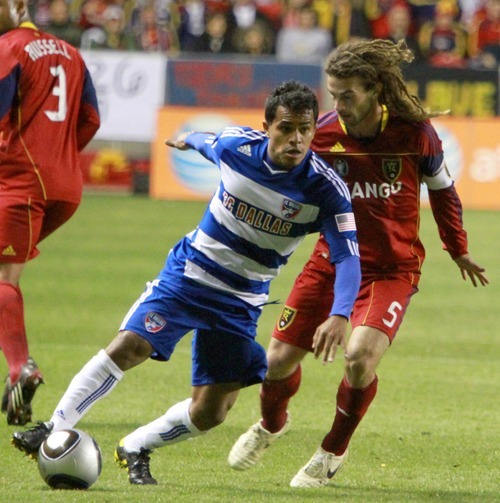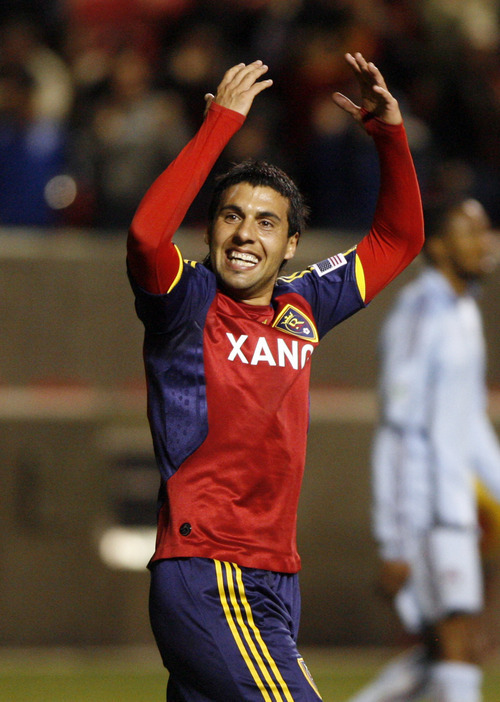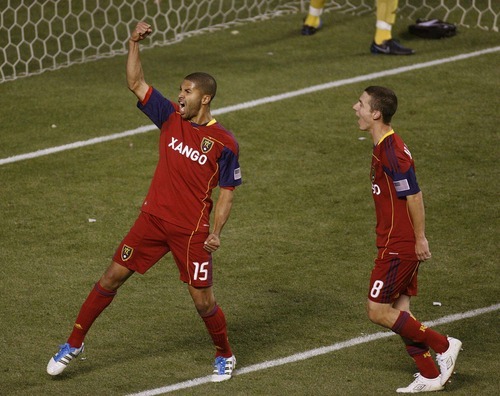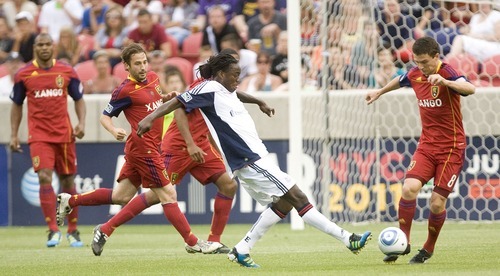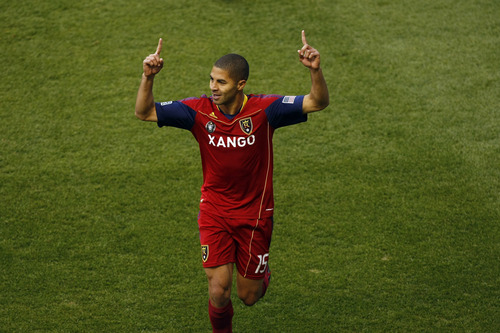This is an archived article that was published on sltrib.com in 2012, and information in the article may be outdated. It is provided only for personal research purposes and may not be reprinted.
When Major League Soccer first introduced the concept of the "designated player," many viewed it as simply a clever way to allow high-priced international superstar David Beckham to play for the glamorous Los Angeles Galaxy, despite the league's tight salary budget.
And pretty much, it was.
But something else has happened in the five years since the rule was adopted to provide teams a way to acquire top players whom they ordinarily would not be able to afford.
Almost every team in the league has made use of it, to various effect, and by all accounts it has helped fuel the unprecedented growth of the league by both improving the quality of the soccer on the field and increasing awareness of the league around the world.
It's probably no coincidence that the league has added seven teams over the past five years — six with their own stadiums, in addition to the five other teams that built new stadiums in that time — watched attendance increase 15 percent to an all-time high, and last summer signed a new television deal with NBC Sports worth a reported $10 million a year.
"It's been an absolute success, in our opinion," said Todd Durbin, an executive vice president for MLS.
Of course, many fans are well aware of the most famous designated players, such as Beckham and New York's Thierry Henry, legendary talents who starred for giant clubs in Europe before joining MLS.
But there have actually been 42 designated players in the league over the past five years, hailing from 22 countries. There are 22 of the DPs in the 19-team league this season — including two at Real Salt Lake.
That might come as a surprise to fans accustomed to hearing how the "team is the star."
But forward Alvaro Saborio and midfielder Javier Morales are designated players, putting RSL on par with eight other teams in the league that have at least two of them.
Three teams have three DPs, including the defending champion Galaxy, Toronto FC, and the Seattle Sounders; along with RSL, those are also the MLS teams that have advanced the farthest in the CONCACAF Champions League the past two years.
"The biggest one was David Beckham," RSL's Kyle Beckerman said. "Once that happened, it kind of exploded, and the whole world took notice of our league. And it definitely, I think, encouraged other players to do the same thing as him, and see what MLS was all about.
"It's good for our league, it's good for teams, it's good for young players, it's good for everybody," Beckerman added. "It's a win-win situation. If you can find one that fits in your team, then I don't see any reason why not to do it."
So what's the rule?
Each team is allowed two "designated players" who can be paid as much as they can negotiate, with only $350,000 counting against the team's $2.81 million salary budget. (The charge is less for designated players under 23 years old.) Teams can also purchase a third designated player spot on the roster for $250,000, which is divided among the teams in the league with fewer than three DPs.
Teams are also allowed to amortize the cost of acquiring a player into his charge against the salary cap, which is why Saborio is considered a designated player. His $305,625 salary last year alone wouldn't do it — he's among the lowest-paid of the current DPs — but once RSL added the cost of buying his contract from FC Sion in Switzerland, he eclipsed the threshold.
Morales, on the other hand, earned $452,500 last season, according to the MLS Players Union.
General manager Garth Lagerwey said the team in the past had used "allocation money" — basically, credits against the salary cap — to effectively "buy down" the amount that Morales counted against the cap.
But this season, it's using its allocation money on other players, making Morales a prototypical designated player, though at a much lower salary than the highest-paid DPs.
Beckham earned $6.5 million last year, while Henry earned $5.6 million and New York's Rafael Marquez made $4.6 million.
"There was a breakthrough last year — it was probably an overdue breakthrough — but last year L.A. won the title with three DPs," Lagerwey said. "And I think that increased the pressure, the arms-race pressure, to have these kind of players on your team. That you were likely at a competitive disadvantage if you didn't have them."
Of course, not every DP has been a raging success.
For every Henry, there is a Mista (Toronto). For every Beckham, a Denilson (FC Dallas).
But in general, most players and coaches agree that teams that sign designated players who fit their system can thrive, and that the influx of talent has made the league better. No longer are DPs necessarily over-the-hill international superstars looking to finish their careers all but on vacation in America, either.
"Now, you've got guys coming in who are in their late 20s and early 30s and are ready to make an impact on a team and win a championship," RSL's Nat Borchers said.
For coach Jason Kreis, the rule is best because it allows teams flexibility. They can sign high-profile superstars and pay them millions if they wish, but they aren't under orders to do so.
"The DP rule has definitely raised the awareness level of our league," he said. "It's raised the television worldwide. You hear people in Argentina talking about seeing our games, and my brother in Europe gets to see games and people in England watching games. Then you're going to see more players: 'Oh, wait. That's a decent league. I wouldn't mind having a look at that,' or 'That might be an option for me.' So I think the DP rule is a good decision."
Twitter: @MCLTribune —
The rule
The "designated player" rule allows teams to have as many as three players whose salaries count only partially against their $2.81 million salary cap. Each team is allowed two DP spots for "free," while a third must be effectively purchased for $250,000 — money that gets distributed among the teams in the league that do not have three designated players. The intent is to help teams acquire top players they otherwise might not be able to afford.
The history
All but two of the 19 Major League Soccer teams have employed a designated player at one point since the rule was put into effect five years ago. Who are the two? The Colorado Rapids and the expansion Montreal Impact, who both play RSL at Rio Tinto Stadium next week.
DPs today
Eleven of the 19 teams now in the league have designated players this season — including Real Salt Lake, which has two. The Los Angeles Galaxy, Seattle Sounders and Toronto FC each have three, while D.C. United, the New York Red Bulls, FC Dallas and the Portland Timbers also have two.
Source: Major League Soccer —
Current MLS Designated players
David Beckham • LA Galaxy
Julian de Guzmán • Toronto FC
Landon Donovan • LA Galaxy
Branko Boškovic • D.C. United
Thierry Henry • NY Red Bulls
Alvaro Fernandez • Seattle Sounders
Rafael Marquéz • NY Red Bulls
Fredy Montero • Seattle Sounders
David Ferreira • FC Dallas
Alvaro Saborío • Real Salt Lake
Eric Hassli • Vancouver Whitecaps
Fabian Castillo • FC Dallas
Diego Chará • Portland Timbers
Torsten Frings • Toronto FC
Danny Koevermans • Toronto FC
Robbie Keane • LA Galaxy
Mauro Rosales • Seattle Sounders
Hamdi Salihi • D.C. United
Kris Boyd • Portland Timbers
Fredy Adu • Philadelphia Union
Shalrie Joseph • New England Revolution
Javier Morales • Real Salt Lake
Source: Major League Soccer —
Where DPs are from
Nations that have produced designated players:
Argentina
Brazil
Germany
Gambia
Mexico
Colombia
Peru
Spain
Switzerland
Sweden
England
Canada
United States
Montenegro
France
Uruguay
Costa Rica
Netherlands
Ireland
Grenada
Scotland
Albania
Source: Major League Soccer —
The history
All but two of the 19 Major League Soccer teams have employed a designated player at one point since the rule was put into effect five years ago. Who are the other two? The Colorado Rapids and the expansion Montreal Impact, who both play RSL at Rio Tinto Stadium next week.


